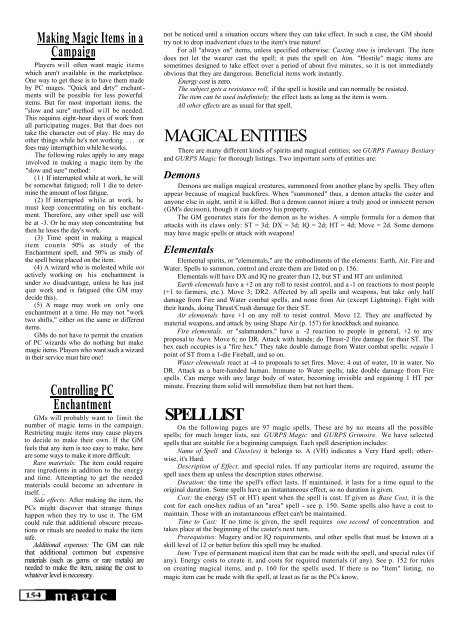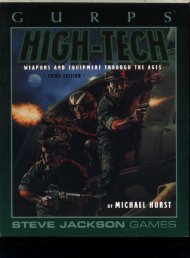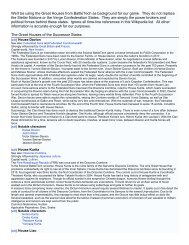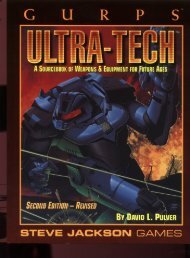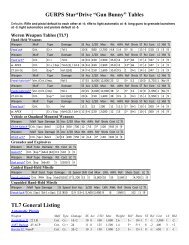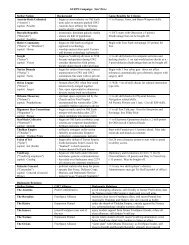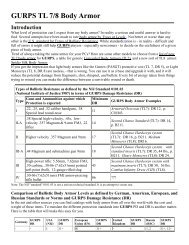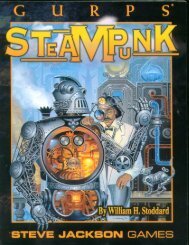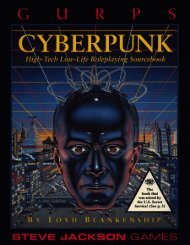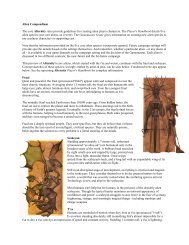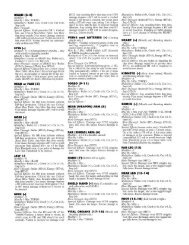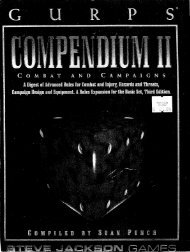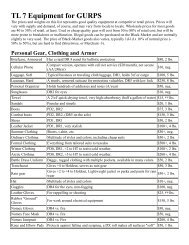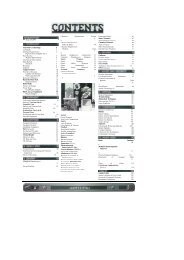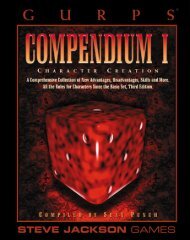won't work. If anyone but the caster and assistants is present (within 10 yards, or able to see thecaster), the spell is at a further -1. Thus, keeping guards to protect against a possiblebackfire adds to the danger of a backfire.A failed roll means the enchantment is perverted in some way, or is a wholly differentspell - GM's choice. The caster won't know his spell went wrong unless he uses AnalyzeMagic or tries the item!Slow and Sure EnchantmentThis method is used when the "quick and dirty" method can't generate enough power, orwhen a mage wants to be sure it's done right. The process takes one mage-day for each pointof energy required. Thus, if an item has an energy cost of 100, it may be created by one mage in100 days, two in 50 days, three in 34 days, and so on. Again, full eight-hour days of work arerequired. As for other types of ceremonial magic, all the caster's assistants must be presentevery day. Spectators may not help.Example: Four mages are making a Stone Missile staff (see p. 156). This requires 400points of energy. So the casting takes 400/4, or 100, days.Each mage in the Circle must be present for each day of work. If a day's work isskipped or interrupted, two days will be required to make up for each day skipped. Loss of amage simply ends the project! The final skill roll is made on the last day. No energy expenditureis required; the energy has been put in gradually as the spell progressed.A failed roll means the enchantment simply didn't work. The time and energy are lost, asare the materials used in the spell. (Exception: If the item was already magical, it isunharmed, though extra materials are lost.) Note that, as with other ceremonial magic, a roll of16 fails automatically.This method can be combined with "energy for skill." p. 151. to let a mage take a verylong time and make an item of very high Power.USING A MAGIC ITEMMagical items follow the rules given for the spell(s) they contain - see the Spell List.Most items give the user the power to cast that spell. Some let him cast the spell only onhimself; others let him cast it on any subject. If a spell can be put into a magic item, this will bedetailed at the end of the spell description. Unless specified otherwise:Casting time is as described for the spell: high Power does not affect this.No ritual is required unless specified for a particular item. In general, the user just wills itto work.Energy cost is the same as for a normal casting of the spell, and is not affected by theitem's Power (though an item may be "self-powered" to reduce the energy required to use it -see p. 160).Success is determined normally, using the item's Power as the caster's basic skill andapplying normal modifiers. Power is at -5 in low-mana areas.The item can be used indefinitely - the magic does not "wear out."All other effects are as described for normal use of the spell.Only one person at a time can control a magic item. If two people are touching a magicitem (struggling for control of a staff, for instance), only the first to touch it can use it. If onecan't use it (e.g.. because it is only for mages) his touching it doesn't count.Resistance and Power: If a spell can be resisted when cast normally, it can be resistedwhen cast from a magic item. Roll a contest: the item's Power (see p. 152) vs. the subject'sresistance for that spell. Therefore, items of high Power are harder to resist. And magic items areeasier to resist in low-mana areas - their Power is reduced by 5."Always On" ItemsCertain magical items are described as "always on." They must be worn or carried inorder to work. These items don't let the wearer cast the spell: they automatically cast it on thewearer at no energy cost. If the spell is one which could be resisted if cast normally, aresistance roll may be made.Picking an item up momentarily, to examine it. is not "wearing" it. But cam ing it inyour hand, or putting it on. is. As a rule, a beneficial item must be worn or touched in order towork, but a harmful one will affect you even if carried in your pocket.If an arrow or dart is enchanted with hostile magic, it may be carried without harm. Itonly affects the person it sticks in! That person is "wearing" it until it is removed by a successfulPhysician or First Aid roll (requires one minute) or by brute force (does the samedamage the missile initially did)!The new owner of a magic item may not immediately learn its powers. Some effects(e.g.. increased ST or DX) will be obvious immediately. Others (e.g.. water-breathing) willPowerstone CostsPowerstones (see p. 161) are a specialcase, because a Powerstone is built up by anumber of small castings, each requiring20 energy. The size of a gem, in carats,gives the maximum strength it can have as aPowerstone - a 20-carat gem can become aST 20 Powerstone, but no more.We make the following assumptions:Cost for each casting of the spellPowerstone: $20. Cost for a gem that issuitable for making a strength P Powerstone:$10 x P 2 + $40 x P. Daily pay for anaverage enchanter mage: $25. Expectedrate of return for money invested inPowerstones: 0.1% per day (36% peryear).The average cost of Powerstones, especiallylarge ones, is increased by a cumulativefactor which represents the chance thatone of the castings will result in a criticalfailure, destroying the stone. For a Powerstoneof ST 60, the chances are over 2 in 3that the stone will be destroyed before itreaches the desired size! Thus, the expectedcost to make a ST 60 Powerstone ismore than three times that which would begiven simply by adding the cost of the gemto the cost of casting the spell 60 times.There is always a demand for goodPowerstones without peculiar quirks (seep. 161), so retail magic-sellers alwaysmark the price up. Typical retail prices areshown in the second column.SizeCost to make Typical retail12.80175150300343004505009005 620 1,2006 850 1,600781,0501,3502,0002,5009 1,650 3,10010 2,000 4,00012 2,750 5,50015 4,250 8,20020 7,700 15,00025 12,500 24,00030 19,000 40,000354028,00039,00058,00080,00045 54,000 110,00050 72,000 150,0006070120,000195,000250,000500,00080 305,000 850,00090 460,000 1,200,000100 680,000 2,000,000
Making Magic Items in aCampaignPlayers will often want magic itemswhich aren't available in the marketplace.One way to get these is to have them madeby PC mages. "Quick and dirty" enchantmentswill be possible for less powerfulitems. But for most important items, the"slow and sure" method will be needed.This requires eight-hour days of work fromall participating mages. But that does nottake the character out of play. He may doother things while he's not working ... orfoes may interrupt him while he works.The following rules apply to any mageinvolved in making a magic item by the"slow and sure" method:(1) If interrupted while at work, he willbe somewhat fatigued; roll 1 die to determinethe amount of lost fatigue.(2) If interrupted while at work, hemust keep concentrating on his enchantment.Therefore, any other spell use willbe at -3. Or he may stop concentrating butthen he loses the day's work.(3) Time spent in making a magicalitem counts 50% as study of theEnchantment spell, and 50% as study ofthe spell being placed on the item.(4) A wizard who is molested while notactively working on his enchantment isunder no disadvantage, unless he has justquit work and is fatigued (the GM maydecide this).(5) A mage may work on only oneenchantment at a time. He may not "worktwo shifts," either on the same or differentitems.GMs do not have to permit the creationof PC wizards who do nothing but makemagic items. Players who want such a wizardin their service must hire one!Controlling PCEnchantmentGMs will probably want to limit thenumber of magic items in the campaign.Restricting magic items may cause playersto decide to make their own. If the GMfeels that any item is too easy to make, hereare some ways to make it more difficult:Rare materials: The item could requirerare ingredients in addition to the energyand time. Attempting to get the neededmaterials could become an adventure initself. ..Side effects: After making the item, thePCs might discover that strange thingshappen when they try to use it. The GMcould rule that additional obscure precautionsor rituals are needed to make the itemsafe.Additional expenses: The GM can rulethat additional common but expensivematerials (such as gems or rare metals) areneeded to make the item, raising the cost towhatever level is necessary.not be noticed until a situation occurs where they can take effect. In such a case, the GM shouldtry not to drop inadvertent clues to the item's true nature!For all "always on" items, unless specified otherwise: Casting time is irrelevant. The itemdoes not let the wearer cast the spell; it puts the spell on him. "Hostile" magic items aresometimes designed to take effect over a period of about five minutes, so it is not immediatelyobvious that they are dangerous. Beneficial items work instantly.Energy cost is zero.The subject gets a resistance roll, if the spell is hostile and can normally be resisted.The item can be used indefinitely; the effect lasts as long as the item is worn.All other effects are as usual for that spell.MAGICAL ENTITIESThere are many different kinds of spirits and magical entities; see <strong>GURPS</strong> Fantasy Bestiaryand <strong>GURPS</strong> Magic for thorough listings. Two important sorts of entities are:DemonsDemons are malign magical creatures, summoned from another plane by spells. They oftenappear because of magical backfires. When "summoned" thus, a demon attacks the caster andanyone else in sight, until it is killed. But a demon cannot injure a truly good or innocent person(GM's decision), though it can destroy his property.The GM generates stats for the demon as he wishes. A simple formula for a demon thatattacks with its claws only: ST = 3d; DX = 3d; IQ = 2d; HT = 4d; Move = 2d. Some demonsmay have magic spells or attack with weapons!ElementalsElemental spirits, or "elementals," are the embodiments of the elements: Earth, Air. Fire andWater. Spells to summon, control and create them are listed on p. 156.Elementals will have DX and IQ no greater than 12, but ST and HT are unlimited.Earth elementals have a +2 on any roll to resist control, and a -1 on reactions to most people(+1 to farmers, etc.). Move 3; DR2. Affected by all spells and weapons, but take only halfdamage from Fire and Water combat spells, and none from Air (except Lightning). Fight withtheir hands, doing Thrust/Crush damage for their ST.Air elementals have +1 on any roll to resist control. Move 12. They are unaffected bymaterial weapons, and attack by using Shape Air (p. 157) for knockback and nuisance.Fire elementals, or "salamanders," have a -2 reaction to people in general, +2 to anyproposal to burn. Move 6; no DR. Attack with hands; do Thrust-2 fire damage for their ST. Thehex each occupies is a "fire hex." They take double damage from Water combat spells; regain 1point of ST from a 1-die Fireball, and so on.Water elementals react at -4 to proposals to set fires. Move: 4 out of water, 10 in water. NoDR. Attack as a bare-handed human. Immune to Water spells; take double damage from Firespells. Can merge with any large body of water, becoming invisible and regaining 1 HT perminute. Freezing them solid will immobilize them but not hurt them.SPELL LISTOn the following pages are 97 magic spells. These are by no means all the possiblespells; for much longer lists, see <strong>GURPS</strong> Magic and <strong>GURPS</strong> Grimoire. We have selectedspells that are suitable for a beginning campaign. Each spell description includes:Name of Spell and Class(es) it belongs to. A (VH) indicates a Very Hard spell; otherwise,it's Hard.Description of Effect, and special rules. If any particular items are required, assume thespell uses them up unless the description states otherwise.Duration: the time the spell's effect lasts. If maintained, it lasts for a time equal to theoriginal duration. Some spells have an instantaneous effect, so no duration is given.Cost: the energy (ST or HT) spent when the spell is cast. If given as Base Cost, it is thecost for each one-hex radius of an "area" spell - see p. 150. Some spells also have a cost tomaintain. Those with an instantaneous effect can't be maintained.Time to Cast: If no time is given, the spell requires one second of concentration andtakes place at the beginning of the caster's next turn.Prerequisites: Magery and/or IQ requirements, and other spells that must be known at askill level of 12 or better before this spell may be studied.Item: Type of permanent magical item that can be made with the spell, and special rules (ifany). Energy costs to create it, and costs for required materials (if any). See p. 152 for ruleson creating magical items, and p. 160 for the spells used. If there is no "Item" listing, nomagic item can be made with the spell, at least as far as the PCs know.
- Page 3 and 4:
17. FLIGHT.........................
- Page 5 and 6:
Materials Needed for PlayThe GURPS
- Page 7 and 8:
WHAT IS ROLEPLAYING?A roleplaying g
- Page 9 and 10:
Character TypesThere are no "charac
- Page 12 and 13:
Four numbers called "attributes" ar
- Page 14 and 15:
You are free to set the physical ap
- Page 16 and 17:
REPUTATIONSome characters are so we
- Page 18 and 19:
These are character traits that are
- Page 20 and 21:
Legal Enforcement Powers 5, 10 or 1
- Page 22 and 23:
Rapid Healing5 pointsThis advantage
- Page 24 and 25:
A minor deity as Patron to a travel
- Page 26 and 27:
ReputationVariable (see p. 17)Socia
- Page 28 and 29:
Lame-15,-25, or -35 pointsYou have
- Page 30 and 31:
Bad Temper-10 pointsYou are not in
- Page 32 and 33:
Dyslexia-5 or -15 pointsYou have a
- Page 34 and 35:
Pacifism-15 or -30 pointsYou are op
- Page 36 and 37:
Shyness-5,-10,-15 pointsYou are unc
- Page 38 and 39:
You have a significant responsibili
- Page 40 and 41:
A "quirk" is a minor personality tr
- Page 42 and 43:
SpecializingRequired Specialization
- Page 44 and 45:
MEANING OF SKILL LEVELSSo you have
- Page 46 and 47:
Teamster (Mental/Average)Defaults t
- Page 48 and 49:
Skiing (Physical/Hard)Defaults to D
- Page 50 and 51:
Guns/TL (Physical/Easy)Defaults to
- Page 52 and 53:
Any of these skills can be self-tau
- Page 54 and 55:
Levels of Language SkillThis table
- Page 56 and 57:
Most outdoor skills can be learned
- Page 58 and 59:
PSIONIC SKILLSThese are special men
- Page 60 and 61:
Forensics/TL (Mental/Hard)Defaults
- Page 62 and 63:
Few Hundred Acres: Knowledge of far
- Page 64 and 65:
Many skills in this category are ta
- Page 66 and 67:
Lockpicking/TL (Mental/Average) Def
- Page 68 and 69:
Gunner/TL See Combat Skills, p. 50M
- Page 70 and 71:
Now you need to decide what equipme
- Page 72 and 73:
Each suit of "real" armor includes
- Page 74 and 75:
Listing Weapons On Your Character S
- Page 76 and 77:
Recording Encumbrance on YourCharac
- Page 78 and 79:
Passive Defense. The first blank is
- Page 80 and 81:
The longer (and the more skillfully
- Page 82 and 83:
When you improve a skill, the cost
- Page 84 and 85:
Not all the advantages and disadvan
- Page 86 and 87:
But remember . . . some skills have
- Page 88 and 89:
ClimbingTo climb anything more diff
- Page 90 and 91:
SwimmingThe Swimming skill (p. 49)
- Page 92 and 93:
WILL ROLLSWhen a character is faced
- Page 94 and 95:
The GURPS combat system is designed
- Page 96 and 97:
WaitDo nothing unless a foe comes w
- Page 98 and 99:
You may only block one attack per t
- Page 100 and 101:
Missile WeaponsMissile weapons are
- Page 102 and 103: At the end of your move, if you hav
- Page 104 and 105: The rules for attacking a foe are e
- Page 106 and 107: tell you how long it will take. In
- Page 108 and 109: You may normally parry only one att
- Page 110 and 111: CLOSE COMBATUsing the Move, Step an
- Page 112 and 113: (adjusted) ST! Note that a shield h
- Page 114 and 115: Ranged Weapon StatsFor each ranged
- Page 116 and 117: second. On the table, this rounds u
- Page 118 and 119: If you are using the "hit location"
- Page 120 and 121: Removing or folding the stock of a
- Page 122 and 123: After the initial "freeze" ends, ea
- Page 124 and 125: ATTACKING INANIMATE OBJECTSThere ar
- Page 126 and 127: This subtraction will mostoften aff
- Page 128 and 129: Psionic healing (p. 175) and magica
- Page 130 and 131: DrowningSee the rules for Swimming,
- Page 132 and 133: protects completely. Toughness prot
- Page 134 and 135: Resolving mounted or vehicular comb
- Page 136 and 137: Using Ranged Weapons From Horseback
- Page 138 and 139: This section covers special rules f
- Page 140 and 141: HT: Health and Hit PointsFor a roug
- Page 142 and 143: Swarm AttacksA group of small creat
- Page 144 and 145: Encumbrance and MovementEncumbrance
- Page 146 and 147: A critical miss means the energy co
- Page 148 and 149: oll will not end the spell, but the
- Page 150 and 151: If the subject makes the resistance
- Page 154 and 155: ANIMAL SPELLSThese are the spells r
- Page 156 and 157: If the summoning spell is repeated,
- Page 158 and 159: Cost: 1 for an object up to the siz
- Page 160 and 161: Armor EnchantmentsThese spells work
- Page 162 and 163: AuraInformationShows the caster a g
- Page 164 and 165: Psionics, or "psi" abilities, are p
- Page 167 and 168: GlossaryESP - Extra-Sensory Percept
- Page 169 and 170: Psionics and MagicMagic and psionic
- Page 171 and 172: PSYCHOKINESISThis power covers movi
- Page 173 and 174: Pside EffectsPsi skills can have "s
- Page 175 and 176: Limitations(Continued)Fickle: varia
- Page 177 and 178: Player-Made MapsWhenever the player
- Page 179 and 180: Predetermined ReactionsCertain NPCs
- Page 181 and 182: Dealing with the PlayersArgumentsAs
- Page 183 and 184: Time Use SheetsThe Time Use Sheet (
- Page 185 and 186: Weapons and Armor0. Fists and stone
- Page 187 and 188: Weather(Continued)WindWinds from ga
- Page 189 and 190: Gold and SilverA traditional assump
- Page 191 and 192: JobsThe jobs available in each game
- Page 193 and 194: Job (Prerequisites), Monthly Income
- Page 195 and 196: Sooner or later, every GM wants to
- Page 197 and 198: Features of a GoodAdventureA good a
- Page 199 and 200: World-BuildingA game world is a com
- Page 201 and 202: CRITICAL HIT TABLEAll doublings or
- Page 203 and 204:
When the players meet an NPC whose
- Page 205 and 206:
Weapons are listed in groups, accor
- Page 207 and 208:
MODERN AND ULTRA-TECH WEAPONSWeapon
- Page 209 and 210:
ANCIENT/MEDIEVAL ARMORUse this tabl
- Page 211 and 212:
FANTASY/MEDIEVAL EQUIPMENTThe follo
- Page 231 and 232:
After eight printings of the GURPS
- Page 233 and 234:
of Divination should match the "fla
- Page 235 and 236:
Minor disadvantage: -5 points. Agai
- Page 237 and 238:
Whether through an accident of birt
- Page 239 and 240:
Note that this disadvantage is inco
- Page 241 and 242:
SKILLSARTISTIC SKILLSVideo Producti
- Page 243 and 244:
traders, and chess-like games are c
- Page 245 and 246:
If, during an adventure, a philosop
- Page 247 and 248:
VITAL ORGANSThese are optional rule
- Page 256 and 257:
INSTANT CHARACTERSThis quick refere


